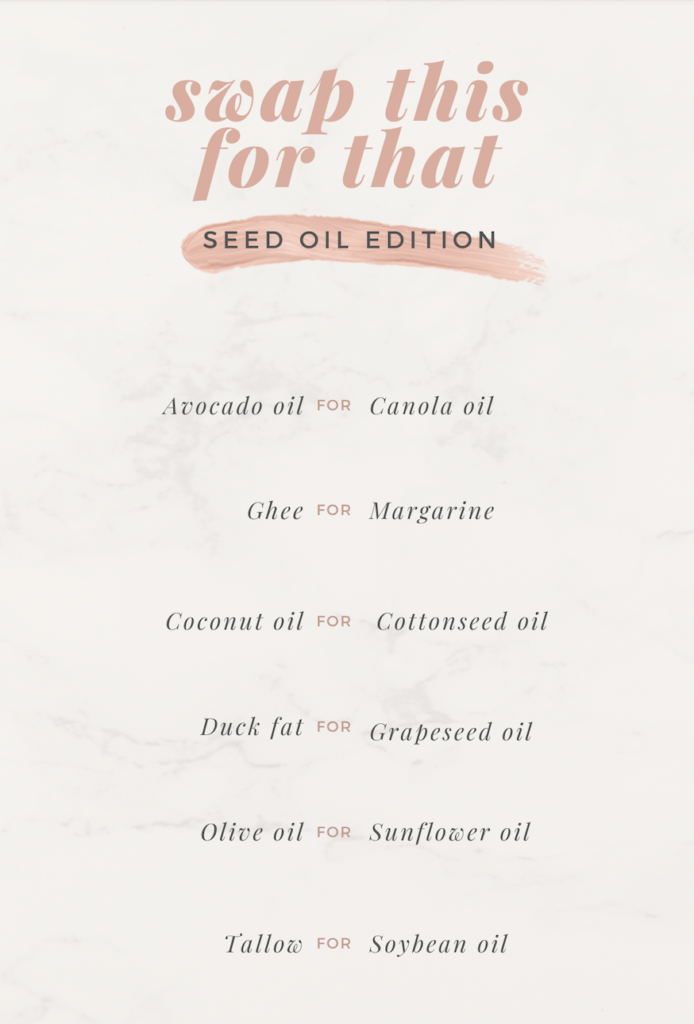Healthy eating is a slippery slope. What can begin as an honest attempt to live healthier can quickly segue into a rigid set of rules and restrictions. Been there, done that. Instead, the goal is to take a balanced, non-dogmatic approach. Hello, afternoon ice cream cone! At the same time, nutrition is key for longevity, skin health, hormone balance, and more. The more you know, the more you’ll reach for nutrient-dense foods (like quality protein, colorful produce, and nourishing fats). Speaking of fats, today we’re diving into the not-so-feel-good fats. Enter: industrial seed oils. Here’s your helpful guide to seed oils and healthier swaps.

seed oils are almost impossible to avoid
Unfortunately, seed oils are everywhere. You’ll find them in mainstream packaged foods, baked goods, protein bars, salad dressings, and more. Let’s uncover what industrial seed oils are, how to spot them, and why they’re making many of us sick. Plus, better swaps. You’ll make more informed choices with this guide to seed oils.

What are industrial seed oils?
Industrial seed oils are highly-processed oils. They’re extracted from soybeans, corn, rapeseed (the source of canola oil), cottonseed, and safflower seeds. They’re devoid of nutrients and calorically dense. Unlike traditional fats—such as olive oil, coconut oil, butter, ghee, and lard—industrial seed oils are a very recent addition to the human diet.
| Fats That Nourish | Fats that Inflame |
| Avocado oil | Canola oil |
| Butter | Corn oil |
| Coconut oil | Cottonseed oil |
| Duck fat | Grapeseed oil |
| Ghee | Margarine |
| Goose fat | Peanut oil |
| Lard | Safflower oil |
| Olive oil | Sunflower oil |
| Tallow | Soybean oil |
Where did industrial seed oils come from?
Americans started consuming industrial seed oils in the early 1900s. Unfortunately, we swiftly began replacing animal fats with their seed counterparts. To this day, they’re deeply ingrained in our food system. These oils are used in virtually all ultra-processed package and frozen foods. A vast majority of restaurants use them, too. Why? They’re cheap. But here’s the thing: they’re not entirely useless. Canola oil, for example, makes for a great lubricant for machinery. Seed oils are also being studied as alternatives to non-renewable petroleum products (for fueling cars, making plastic, and even formulating printer ink). All of that to say, should we be eating them? Probably not.

how are seed oils made?
- First, seeds are gathered from soy, corn, cotton, safflower, and rapeseed plants.
- Next, the seeds are heated to extremely high temperatures. This causes their unsaturated fatty acids to oxidize.
- The seeds are then processed with a petroleum-based solvent. This maximizes the amount of oil extracted.
- Next, industrial seed oil manufacturers use chemicals to deodorize the oils. The deodorization process produces trans fats (double trouble for heart health).
- Finally, more chemicals are added. Why? To improve their color.
Why Industrial Seed Oils are Making Us Sick
Based on that process, you can glean why. Historically, industrial seed oils represent an evolutionary mismatch. Unlike modern day civilization, our ancestors ate olive oil, butter, coconuts, etc. Their fats came from whole foods. Nowadays, industrial seed oils are making us sick. They raise inflammatory markers in the body, oxidize easily, and contain harmful additives. They’re also derived from GMOs. And repeatedly heated, they’re even more toxic. As often as possible, crowd out industrial seed oils. In turn, make space for satiating, nourishing fats. Your body, your mind, and the planet will thank you.

3 reasons to avoid seed oils
There are many reasons to avoid seed oils, but these are the top three:
They’re Derived from Destructive Agriculture
Seed oils deplete our soil and farmland. They’re the top genetically modified crops (corn, soy, cottonseed, and canola) and support the ultra-processed food industry. When those companies thrive, so does widespread chronic health problems, environmental destruction, political and scientific corruption, and social injustice.
They Play a Significant Role in Chronic and Inflammatory Diseases
Eating industrial seed oils can pose serious consequences to our health. We need healthy fats to thrive, but the Standard American Diet tends to skew the ratio in favor of omega-6 fats (thanks, largely, to industrial seed oils). This can contribute to system-wide inflammation, increasing the risk of cardiovascular issues, nonalcoholic fatty liver disease, rheumatoid arthritis, digestive issues, and cancer.
They’re Devoid of Nutrients
Unlike avocados, coconuts, olives, butter, and other animal fats, industrial seed oils are not nutrient-dense. They don’t contain vitamins A, E, etc. In fact, they’re very unstable and oxidize easily by heat, light, and air. Said differently: they’re nutrient-poor and are full of unsavory chemicals and toxic byproducts.
Eat These Oils healthier oils Instead
The best thing you can do for your own health—and the health of your family—is to toss the vegetable oils. Replace them with ghee, clarified butter, pastured-raised beef tallow, coconut oil, avocado oil, etc. And when shopping for plant-based butter and cheese alternatives, be mindful of ingredient labels. For vegan swaps, Violife is my go-to! Source pure extra-virgin olive oil from Italy, Spain, or Greece. And look for words like cold-pressed and first-pressed. More on healthy cooking oils and their smoke points, here.

I hope this guide to seed oils is helpful! While avoiding seed oils is nearly impossible, aim to only keep healthy, nourishing fats in your home—particularly when you’re cooking and baking.
Images courtesy of Unsplash.
This post contains affiliate links. Thank you for supporting Wellness with Edie! This article is for informational purposes only. It is not, nor is it intended to be, a substitute for professional medical advice, diagnosis, or treatment and we recommend that you always consult with your healthcare provider.



Leave a Reply